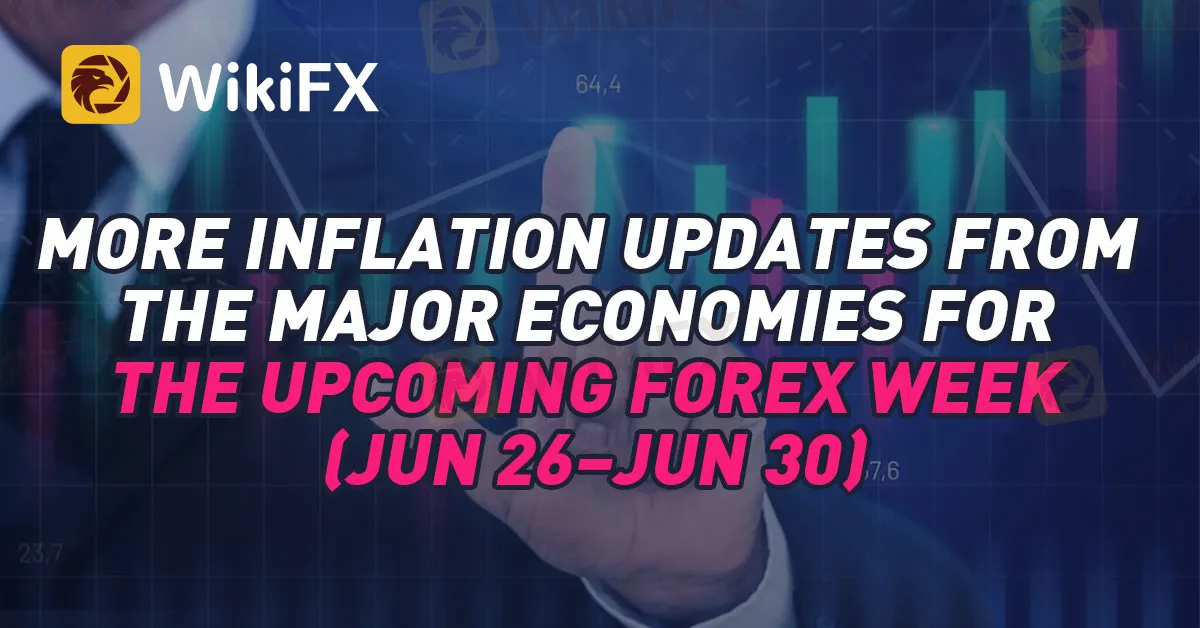简体中文
繁體中文
English
Pусский
日本語
ภาษาไทย
Tiếng Việt
Bahasa Indonesia
Español
हिन्दी
Filippiiniläinen
Français
Deutsch
Português
Türkçe
한국어
العربية
MORE INFLATION UPDATES FROM THE MAJOR ECONOMIES FOR THE UPCOMING FOREX WEEK (JUN 26–JUN 30)
Abstract:Will the "sticky inflation" thesis be supported by this week's consumer price statistics, leading banks to resume hiking interest rates?

Will the “sticky inflation” thesis be supported by this week's consumer price statistics, leading banks to resume hiking interest rates?
Canada, the Eurozone, and the United States will publish their most recent inflation-related statistics this week.
ICYMI, I've provided a brief overview of the market themes that moved currency pairs last week before all that. Verify it!
The week's most anticipated economic indicators are as follows:
Canadian CPI data
In April, Canada's headline consumer prices increased by 0.7%, than the 0.5% increase witnessed in March. The annualized inflation rate, which many had anticipated to fall from 4.3% to 4.1%, also shocked to the upside, printing at 4.4%.
Markets anticipate a further 0.5% increase in headline prices in May on June 27 at 12:30 PM GMT, which could be sufficient to reduce annual inflation from 4.4% to 3.6%.
Despite the lower projections, the Bank of Canada will still raise rates by 25 basis points in July despite the low CPI readings.
Conversation among central bankers
This week's central banking forum will be held at the European Central Bank (ECB). You should keep an eye out for the panel discussion on June 29 at 1:30 GMT.
A speech from ECB President Lagarde, prominent central bankers like Powell of the Fed, Ueda of the BOJ, and Bailey of the BOE will also be speaking.
Watch out for broad trends and nuggets that major central banks' policy trajectories!
Core PCE pricing index for the US
Uncle Sam will discontinue using the metric on Friday at 12:30 PM GMT.
The primary Personal Consumption Expenditures (PCE) price index is what I'm referring to. There is a rumor that the figures decrease in pricing in May.
Core PCE could fall from 0.4% to 0.3% on a monthly basis, which would cause drop from 4.7% to 4.3%.
Of course, Powell and his fellow central bankers' headlines hints we receive.
preliminary Eurozone CPI data
There will be other notable events from the region in addition to the ECB's central bank conference!
Top Eurozone economies like Germany (0.2% m/m predicted vs. -0.1% in April), France (0.2% m/m expected vs. -0.1% in April), and Spain (1.7% y/y vs. 3.2% in April) will release their preliminary CPI estimates during the coming days.
While core prices may still increase from 5.3% y/y to 5.5% y/y, headline prices in the Eurozone are predicted to slow from 6.1% y/y to 5.6% y/y. Higher-than-expected Keep an eye out when the May readings are revealed because they may increase ECB hawkish forecasts!
EUR/USD Daily Forex News and Watchlist
The dollar seems to be retracing its gains from last week, but will trends soon pick up again?
I'm seeing a straightforward pullback play on the EUR/USD.
ICYMI, I've outlined the probable economic triggers you should be aware of this week before moving on. Before you make your first deals today, check them out!
Here are the news stories that shook the markets in recent trading sessions:
Fresh Market News & Economic Information
Jordan, the head of the SNB, said in an interview over the weekend that there is not enough to control inflation.
One committee member demanded that their YCC policy be revised as soon as possible, according to the BOJ Summary of Opinions.
S&P decreased its annual projection for Chinese GDP from 5.5% to 5.2%, citing the possibility of uneven growth.
On the Forex Economic Calendar:
· the German Ifo business climate index will be released at 8:00 AM GMT.
· testimony of SNB chief Jordan at 8:50 AM GMT
· Speech by ECB President Lagarde at 5:30 PM GMT

Disclaimer:
The views in this article only represent the author's personal views, and do not constitute investment advice on this platform. This platform does not guarantee the accuracy, completeness and timeliness of the information in the article, and will not be liable for any loss caused by the use of or reliance on the information in the article.
Read more

Why Is UK Inflation Rising Again Despite Recent Lows?
October inflation rises to 2.3%, driven by energy costs. Renters face 8% annual hikes, while house price inflation climbs. Interest rates stay elevated.

How Inflation Rates Affect Forex Prices Globally
In this article, we’ll explore how inflation affects forex prices globally, the relationship between inflation and currency value, and why traders monitor inflation closely.

PH Financial Sector Grows to P32.3T, Up 10.5% in June
The Philippine financial sector expanded by 10.5% in June, reaching P32.3 trillion. Bank resources surged, while positive earnings drove stock market gains.

US Inflation Cools, But Economic Pressures Still Remain
Inflation shows signs of cooling in the U.S., but persistent economic pressures, particularly housing and utilities, continue to challenge growth.
WikiFX Broker
Latest News
Hackers Charged for $11M Crypto Theft Using SIM-Swaps
Role of Central Banks in the FX Market
FCA Alerts Against Sydney FX
What Makes Cross-Border Payments Easier Than Ever?
Trader Exposes Unethical Practices by STP Trading
Malaysian Man Loses RM113,000 in Foreign Currency Investment Scam
Bitcoin Nears $100,000: A Triumph of Optimism or a Warning Sign?
Mastercard Partners with JPMorgan for B2B Cross-Border Payments
FCA Identifies Clone Firm Exploiting Admiral Markets' Credibility
Coinbase Under Scrutiny Amid Wrapped Bitcoin Delisting Controversy
Currency Calculator


